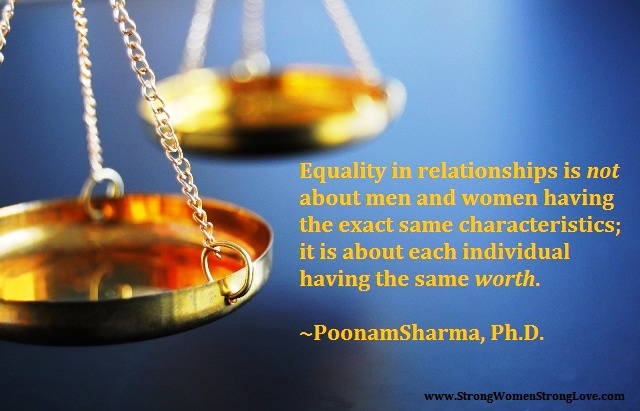by Strong Women Strong Love | Oct 13, 2014 | Persistent Pressures, Understanding Men |

As Halloween gets closer and we’re thinking about scary stuff, I want to let you in on your husband’s secret fears.
I’m not talking about zombies, vampires or other horror movie creatures. Or even everyday creepy-crawlies like spiders.
Here’s the twist: Some of the things that frighten your husband the most might be things you are actually doing.
Of course, you’re not trying to be scary. And you probably don’t see your husband expressing these fears. Guys get conditioned to appear strong and hide any sign of fear or vulnerability. But that doesn’t mean they’re not playing out in other ways in your marriage — for example, if your husband starts to seem withdrawn or distant.
Let’s talk a little more about some of men’s most common fears in relationships and how you can help dispel them.
1. He’s afraid he can’t make you happy.
Men feel great when they can make their wives happy; it’s often how they measure their success as a husband. If your guy is making an effort to please you, but you tend to complain, criticize, or act lukewarm, don’t be surprised if his motivation eventually fizzles. If he sees you constantly down in the dumps and doesn’t know how he can change that, he may end up thinking he’s simply the wrong man for you, and then back off.
How to calm this fear: Assume that your husband cares about your happiness. When he does something to lift you up, let him know it! If he’s making an effort and simply missing the mark, be kind and clue him in on what would work better. There are some romantic but misguided, notions floating around in our culture that if he’s “the one,” he’ll “just know” how to make you happy. He may be fabulous, but I doubt he can read your mind! So, go ahead and tell him what you’d like to do for Valentine’s Day, what helps when you’re upset, even what feels good in bed. He’ll be grateful. And amid the daily stresses of life, don’t forget to flash him a smile now and then.
2. He’s scared that he’s useless. We women have so many more options available to us in our lives. Some of us are the primary breadwinners of the family. Others are choosing to be single parents. Marriage and involvement with men are becoming real choices. It’s not unusual to hear even married women openly say that they “don’t need” a man. As you can imagine, that attitude can do a number on a guy’s self-esteem. Men are still being judged by their ability to take care of the women in their lives. So, it sounds corny, but your husband really wants to be your hero sometime, to have you look you look at him with love and admiration because he brings some significant value to your life.
How to calm this fear: There is no need to suppress your competence or independence as a woman. However, please do remember to create room for your husband to feel effective too. Ask for his help, not because you’re a damsel in distress, but because no one should have to take care of everything by themselves! Let him know that he is of value in the relationship by noticing and appreciating what he provides, whether it’s financial support, practical help, or a shoulder to lean on: “Thanks for cooking dinner today. It really took some pressure off me.” Remember that a healthy relationship has room for both of you to need and depend on each other.
3. He’s terrified of being humiliated. Vulnerability is not something most men allow themselves to experience frequently. A central code of manhood is that a real man must appear strong at all times. You may want your husband to lower his defenses with you, but this may be really scary for him. After all, there is a real risk that if he opens up, you could hurt him.
How to calm this fear: Be extremely disciplined when your husband is exposing his softer side, recognizing that you have tremendous power to hurt him. Men are a lot more sensitive to criticism, disappointment, and rejection than you might imagine. Never insinuate that he is weak, especially when he is emotionally exposed. Otherwise, he may close the door to emotional intimacy permanently. Be respectful, kind, and affirming when your husband takes the risk to let you see parts of himself he seldom shares with anyone else. And then, watch the love and trust grow!
4. He’s worried that he’s not important to you. After being married for a while, you may start to take your husband for granted. Because you assume he’s not going anywhere, he may fall lower down on your priority list and he may truly get less attention. Men worry that they’ll fall off the radar for you after you have kids. And the thing is, they’re often right. I see this happen frequently in relationships. When you understand that for a man, their spouse is often one of very few people with whom he is emotionally close, it’s easier to understand why he may be upset with having less of your time and attention.
How to calm this fear: Make time for each other. In the early days of your relationship, it was easy to feel close. That love and passion don’t have to die now that you’re an established couple with a more demanding schedule. You just have to deliberately commit to making your relationship a clear priority. Remember that strengthening your bond is the best thing you can do for your family. So rather than just saying, “Of course you’re important to me,” go ahead and show it by scheduling some time just for the two of you regularly.
5. He fears being smothered. The opposite extreme — when you don’t have a life outside of your relationship — is pretty scary to men too. No one wants to be the center of another person’s world. It’s exhausting and way too intense!
How to calm this fear: Give your guy a little more space by focusing on yourself and the other important things in your life more often. It sounds counterintuitive, but when you both take time to cultivate yourselves, it will draw you closer together.
Remember, it’s never sustainable for either of you to be driven by fear in your relationship. Want to learn more about your husband’s perspective and what’s behind his actions? Check out my book Strong Women, Strong Love. When you subscribe to the mailing list, you’ll get incredibly useful insights into the male mind with the free report: “10 Easy Ways to Get Him to Listen.”
by Strong Women Strong Love | Jun 12, 2014 | Persistent Pressures, Understanding Men |

With Father’s Day coming, it’s a good time to think about why dads and husbands are so often the butt of our jokes.
Don’t believe me? You can see stereotypes about men’s ineptitude even on Father’s Day cards. How many cards have you noticed that make fun of dads as less competent than moms, or for being interested only in sports and beer? And think about representations of husbands and dads in pop culture. You’re not alone if the bumbling Homer Simpson was the first example that sprang to your mind.
No matter how much silly cards or “Simpsons” reruns make you laugh, they carry some pretty damning messages about men: They’re little boys at heart, just another “child” for a mom to take care of. They don’t express emotions, and they certainly don’t want to talk about them. They don’t understand women, and they don’t know how to care for kids.
All these stereotypes create barriers to men’s full engagement in their relationships, especially in their roles as fathers. In the U.S., our expectations for dads are pitifully low. Maybe you’ve always believed that guys “can’t help it” if they don’t know how to take care of a child because that is just how men are wired.
But everything we are learning about our brains shoots holes in that theory. Have you heard the term “neuroplasticity”? Our brains have an amazing ability to keep evolving throughout our lives. That means that men can improve their relationship skills and learn to nurture children (if they don’t already have these skills).
And it’s my belief that more men would become involved fathers if they were allowed to do so. Just like women, men struggle with stereotypes and expectations about who they “should” be and what they can’t do. For men, it may not be considered so “manly” to put their kids above providing for the family or pursuing a successful career. Think of how socially hard it is to be a stay-at-home dad or how many companies offer paternity leave, and you’ll see what I mean.
I believe our relationships could be so much stronger if we all had more room to be who we really are! Perhaps your low expectations haven’t given your husband room to step up as a dad, or you’ve been pushing for new behaviors, but he insists that he’s just a guy who can’t change. Either way, the following ideas should give you some inspiration for moving beyond the old stereotypes of dads and fathers.
- Learn to hold back. Do you believe your husband can’t handle being alone with their kids, so you never leave him alone with them? Remember that he can’t become competent with the kids unless you give him a chance to be alone with them and learn. So take off for a while, and give him the space to pick up some new skills.
- Don’t hover or micromanage. If your husband does something like change a diaper without prompting, don’t correct him or try to get him to do it exactly the way you do. If he asks for help, give it. If not, let him do things his way.
- Believe in him. When you’re trying to learn something new, it helps tremendously to know that your partner believes in you. Even if you have some doubts about whether he can take on something you usually handle, show him that you have faith.
- Hold him accountable. When your husband flakes out or pulls the “guy card,” call him on it. Explain that it undermines your trust when he doesn’t follow through on something he said he would do.
- Remember the big picture. Sometimes it feels easier to jump in and just handle something yourself, but in the long run, both of you will be happier if you’re both competent parents. So, push through your discomfort and allow change to take hold.
I wish you a wonderful Father’s Day. Go ahead and give your husband that funny Homer Simpson card, if you like. Just remember that he’s capable of far more than Homer is!
by Strong Women Strong Love | May 21, 2014 | Passionate Partnership, Persistent Pressures, Understanding Men |

Have you ever caught yourself saying, “My husband doesn’t appreciate me”? The desire for appreciation and validation is a natural one. We all want a relationship that makes us feel good about ourselves.
Research has shown that an atmosphere of warmth and appreciation is vital to the health of a marriage. Renowned marriage researcher Dr. John Gottman found that couples in long, happy marriages make a habit of noticing the positives. In fact, they typically make about 20 positive statements for every negative one during everyday conversations with their spouse. And even during times of conflict, that ratio of positive to negative is about five to one!
With appreciation being so important, you’re justified in complaining about your husband’s lack of it, right? Well, it’s natural to want appreciation, but waiting for your husband to get the ball rolling is likely to result in continued frustration. He probably doesn’t realize you’re feeling unappreciated. He may not fully grasp everything you do for the family or even why some of it is necessary.
As a woman, your focus may be on maintaining high standards for your home, parenting, and appearance because women are judged more harshly than men in these realms. Since the success and worth of a man is measured differently, your husband may be puzzled by why you’re working so hard and tell you, “Just don’t do it!” if you complain about exhaustion.
Rather than waiting for your husband to notice your contributions, a better strategy is to start showing more appreciation yourself, which will lead your husband to reciprocate. Since men are under pressure to be strong, capable, and confident, genuinely acknowledging these particular qualities may be especially meaningful. I get that this might feel unfair, but I urge you to try it out for a few days as an experiment. You may be surprised to find out that your husband has been feeling some of the same hunger for appreciation as you.
It’s common for husbands and wives to start to take each other for granted. But being deliberate about kindness and appreciation can protect your relationship from stagnation and resentment. Every day this week, make it a goal to notice three positive things about your partner and compliment him on them. Stick with this marriage-boosting habit, and you’ll notice the mood starting to change in your relationship.
by Strong Women Strong Love | Jan 8, 2014 | Persistent Pressures, Understanding Men |

Men and women make assumptions about one another all the time. For example, you must have heard by now that men are:
- Not as emotional as women.
- Have a hard time staying faithful.
- Unable to take care of themselves, let alone the children.
Stereotypes are a mental shortcut, a way for the brain to efficiently process information without having to attend to all the pesky details. Unfortunately, the mind’s tendency to generalize in the name of efficiency can have a detrimental effect on a relationship.
Let’s examine a few stereotypes about men and how these ideas can affect a relationship:
1. Men are not as emotional as women.
Research shows that young boys are actually more emotionally expressive than girls until about first grade. In the early years, boys tend to smile, laugh, and cry more often than girls. After that, there is significant social pressure for them to “toughen up,” and they become less likely to show distress or sadness. By the time they enter a romantic relationship, they have often been well-trained to keep their emotions under wraps.
Feeling emotion and expressing emotion are two different things. For example, if you look at the studies of how men respond to an intense argument with their spouse, you will find that when men appear shut down, they are in fact experiencing intense stress that they are attempting to manage by distancing. They are masters of the Poker Face.
Typically, In response to the frustration of a husband who has withdrawn, many women intensify their pursuit. If you consider the possibility that your partner may actually be overwhelmed by emotion, rather than devoid of it, you would probably choose a different response.
2. Men have a hard time staying faithful.
There is a prevalent idea, even among some researchers, that men are biologically predisposed to seeking multiple partners. This mindset reinforces the idea that men “can’t help themselves” and are incapable of being mature, monogamous, responsible partners. In reality, men often desire a committed, emotionally rewarding relationship as much as women.
For both men and women, the capacity to remain faithful in a relationship is strongly linked to having emotional needs met, much more than it is linked to any biological drive to cheat. Ironically, assuming that your partner is hardwired to cheat can set off fear-based behavior, such as jealousy and constant monitoring, that may ultimately lead to what you fear most.
3. Men are unable to take care of themselves, let alone the children.
Read that one again and notice the disrespect inherent in this idea. This stereotype essentially lumps men and children together and reinforces the notion that men are helpless, useless creatures who will always need mothering.
Because of the different ways males and females continue to be socialized, there can indeed be significant differences in how well they are able to engage in domestic and childcare duties. The majority of women have much more practice in how to take care of the home and children than the men they marry. Because women are frequently judged on their caretaking skills, they face social pressure to be proficient in this area.
That being said, there are plenty of men around these days who are not only willing, but actually open, to being full partners at home. However, if they lack skill in the domestic realm, it is important they be allowed the time and space to develop these abilities in a safe, supportive atmosphere tolerant of the normal mistakes that are part of learning.
It is extremely important to separate biological leanings from social realities. In the same way that women are not biologically engineered to love washing dishes and wiping runny noses, men do not have a gene that prevents them from becoming domestically proficient.
So, check your assumptions about your spouse. Be curious about the social pressures he has faced as a man, and learn the details of his life. After all, both of you deserve to have a partner who relates to the real you, not an inaccurate stereotype that barely scratches the surface.
by Strong Women Strong Love | May 15, 2013 | Excerpts from Strong Women Strong Love, Persistent Pressures, Quotes, Understanding Men |

by Strong Women Strong Love | May 15, 2013 | In the News, Parenthood, Persistent Pressures, Understanding Men |
The next time you see a father out shopping with his kids, you might need to check your assumptions.
“I’ll get the, ‘Oh, look, it’s a dad! That’s so sweet!’ “says Jonathan Heisey-Grove, a stay-at-home father of two young boys in Alexandria, Va., who is pretty sure the other person assumes he’s just giving Mom a break for the day. In fact, he’s part of a growing number of fathers who are minding the kids full time while their wives support the family and who say societal expectations are not keeping up with their reality.
Read the rest of the story at:
http://www.npr.org/2013/05/15/180300236/stay-at-home-dads-breadwinner-moms-and-making-it-all-work






